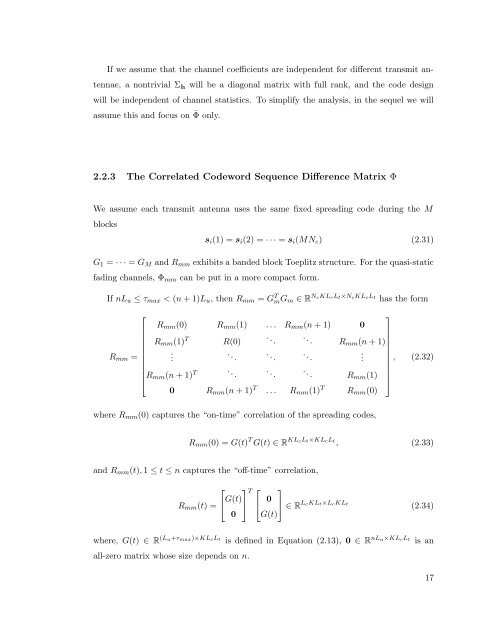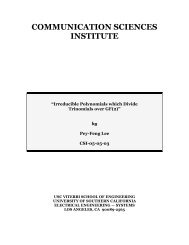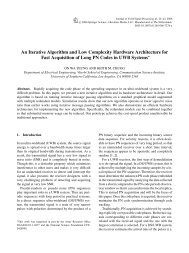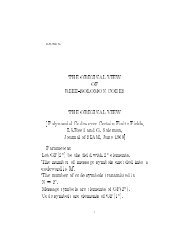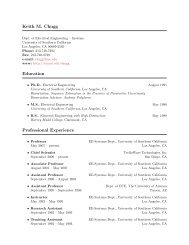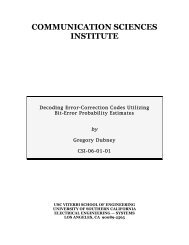Space-Time Block Codes for Wireless Systems - The ...
Space-Time Block Codes for Wireless Systems - The ...
Space-Time Block Codes for Wireless Systems - The ...
Create successful ePaper yourself
Turn your PDF publications into a flip-book with our unique Google optimized e-Paper software.
If we assume that the channel coefficients are independent <strong>for</strong> different transmit antennae,<br />
a nontrivial Σ h will be a diagonal matrix with full rank, and the code design<br />
will be independent of channel statistics. To simplify the analysis, in the sequel we will<br />
assume this and focus on ¯Φ only.<br />
2.2.3 <strong>The</strong> Correlated Codeword Sequence Difference Matrix Φ<br />
We assume each transmit antenna uses the same fixed spreading code during the M<br />
blocks<br />
s i (1) = s i (2) = · · · = s i (MN c ) (2.31)<br />
G 1 = · · · = G M and R mm exhibits a banded block Toeplitz structure. For the quasi-static<br />
fading channels, Φ mm can be put in a more compact <strong>for</strong>m.<br />
If nL u ≤ τ max < (n + 1)L u , then R mm = G T mG m ∈ R NcKLcLt×NcKLcLt has the <strong>for</strong>m<br />
⎡<br />
⎤<br />
R mm (0) R mm (1) . . . R mm (n + 1) 0<br />
R mm (1) T<br />
.<br />
R(0) .. . .. Rmm (n + 1)<br />
R mm =<br />
. .<br />
.. . .. . .. .<br />
, (2.32)<br />
⎢<br />
⎣<br />
R mm (n + 1) T . .. . .. . .. Rmm (1) ⎥<br />
⎦<br />
0 R mm (n + 1) T . . . R mm (1) T R mm (0)<br />
where R mm (0) captures the “on-time” correlation of the spreading codes,<br />
R mm (0) = G(t) T G(t) ∈ R KLcLt×KLcLt , (2.33)<br />
and R mm (t), 1 ≤ t ≤ n captures the “off-time” correlation,<br />
⎡ ⎤<br />
R mm (t) = ⎣ G(t) ⎦<br />
0<br />
⎤<br />
⎣ 0 ⎦ ∈ R LcKLt×LcKLt (2.34)<br />
G(t)<br />
T ⎡<br />
where, G(t) ∈ R (Lu+τmax)×KLcLt is defined in Equation (2.13), 0 ∈ R nLu×KLcLt is an<br />
all-zero matrix whose size depends on n.<br />
17


